- Home
- Joe McKinney
Quarantined
Quarantined Read online
-----------------------------------
Quarantined
by Joe McKinney
-----------------------------------
Suspense/Thriller/Mystery/Crime
* * *
Lachesis Publishing
www.lachesispublishing.com
Copyright ©2009 by J. McKinney
NOTICE: This work is copyrighted. It is licensed only for use by the original purchaser. Making copies of this work or distributing it to any unauthorized person by any means, including without limit email, floppy disk, file transfer, paper print out, or any other method constitutes a violation of International copyright law and subjects the violator to severe fines or imprisonment.
* * *
CONTENTS
Dedication
Quarantined
Chapter 1
Chapter 2
Chapter 3
Chapter 4
Chapter 5
Chapter 6
Chapter 7
Chapter 8
Chapter 9
Chapter 10
Chapter 11
Chapter 12
Chapter 13
Chapter 14
Chapter 15
Chapter 16
Chapter 17
Chapter 18
Chapter 19
Chapter 20
Chapter 21
Chapter 22
Chapter 23
Chapter 24
Chapter 25
Chapter 26
Chapter 27
Chapter 28
Chapter 29
About the Author
* * * *
* * *
QUARANTINED
by
Joe McKinney
* * * *
* * * *
www.lachesispublishing.com
* * *
Published Internationally by Lachesis Publishing
Kingston, Nova Scotia, B0P 1R0
Copyright © 2009 Joe McKinney
Exclusive cover © 2009 Carole Spencer
Inside artwork © 2009 Carole Spencer
All rights reserved. The use of any part of this publication reproduced, transmitted in any form or by any means, electronic, mechanical, photocopying, recording, or otherwise, without the prior written consent of the publisher, Lachesis Publishing, is an infringement of the copyright law.
A catalogue record for the print format of this title is available from the
National Library of Canada
ISBN 1-897370-65-2
A catalogue record for the Ebook format of this title is available from the
National Library of Canada
multiple Ebook formats are available from
www.lachesispublishing.com
ISBN 1-897370-66-0
Credit: Darlene Oakley, editor
This is a work of fiction. Names, characters, places and incidents are either the product of the author's imagination or are used fictitiously, and any resemblance to any person or persons, living or dead, events or locales is entirely coincidental.
* * *
Dedication
To Kristina, Elena and Brenna.
You are my world.
[Back to Table of Contents]
* * *
Quarantined
[Back to Table of Contents]
* * *
Chapter 1
I remember how hot it was that day. It was like trying to breathe with your head inside an oven. San Antonio in August is stifling. The heat grinds down everything it touches.
My skin was pruned from the sweat, and my eyes burned because I couldn't touch my face to wipe the sweat away. The air stank of rotten flesh, even after passing through the new set of filters in the gas mask of my biohazard suit. Between the heat and the stink, I was feeling lightheaded and a little sick.
But beyond the heat and the smell I have a crystal clear picture in my mind of the events of that day. I remember Isaac Hernandez driving his death wagon into our stall at the Scar. I remember walking around the flatbed trailer, looking at the shoeless feet of the dead, clipboard in my hand, while Chunk, my partner, went over the manifest with Hernandez.
That was when I saw the caked on dirt on the bottom of the dead girl's feet. She was one of the bodies up near the front of the trailer, her feet just barely poking out from beneath the tarpaulin. Nothing unusual about dirty feet, except that the gray toe tag she was wearing meant the Medical Examiner's Office had done an autopsy on her, and they rinse the bodies down after they do an autopsy.
Strange.
I pulled back the tarp, and then the white sheet from the dead girl's body. No hastily stitched Y across her chest and belly, no trace of an autopsy.
Very strange.
I looked a little closer, scanned her face. There was no sign of heliotrope cyanosis, the blueberry stain around the mouth that is the tell tale indication of death from the flu.
I looked at the rest of her. There was a bullet hole on the left side of her chest, near her armpit, hidden by the well-toned muscle of her arm.
Definitely not right.
“Let me see your paperwork,” I said to Hernandez, interrupting his conversation with Chunk.
Chunk gave me a look. What's wrong, Lily?
“Grab that paperwork and step on out,” I said. “There's one up here I gotta take a look at.”
Chunk gave me another look. You're kidding? We've got trucks waiting.
The sun was reflecting off the face plate of my mop suit, so Chunk couldn't see my face, but we'd been partners for a long time, and he recognized the tone of my voice and my stance.
“You heard the lady,” he said to Hernandez. “Come on out.”
The girl was a Jane Doe.
Nothing unusual in that. By that August, H2N2, the San Antonio Flu, was killing about twenty-five thousand people a month, and a lot of bodies showed up at the Scar without a name. The trouble was, most of the Does we got were homeless, or poor, so poor that they hadn't been far from homeless when they died, and the girl we had didn't look like she was either of those.
She was young, white, attractive. She looked to be maybe thirty-two or thirty-three. Dynamite figure. Height about 5ft 6 in, weight 115 lbs. Hair was milk chocolate brown, cute cut. Nice manicure. Bikini wax.
Definitely not homeless.
“Somebody's probably missing that,” Chunk said.
“Yeah,” I said. “I was thinking the same thing.”
We started with Isaac Hernandez, the death wagon driver. He was 58. He had a dark complexion and pocked cheeks, a big gut, and powerful arms. He told us he'd lost his wife, all four of his kids, and two of his granddaughters to the flu. “They're buried out there somewhere,” he said, and pointed at the mass graveyard we'd come to call the Scar.
“I'm sorry to hear that,” I said. “But this girl didn't die of the flu.”
“Uh huh,” he said, and stood there, like he was waiting for me to come to the point.
“She was murdered,” I said.
He looked at Chunk, then at me. “I don't know,” he said.
“You don't know what?”
“I don't ... I don't know what you mean.”
“You're kidding me? The girl's on the back of your truck. She's got a bullet in her. You don't know why this is your problem? Is that what you're trying to tell me?”
He blinked at me.
“Well?” I said.
“I didn't kill her,” he said.
I asked him to retrace his route that morning.
“All these bodies came from the Arsenal,” he said, meaning the Bexar County Medical Examiner's temporary morgue facility on Arsenal Street in the city's Tenth District. The shallow west side.
“The Arsenal's mostly poor, mostly Hispanic,” Chun
k said. “This girl ain't either one of those.”
Hernandez shrugged inside the one-size-fits-all plastic biohazard suit the Metropolitan Health District provided for their death wagon drivers. It fit tightly around his meaty shoulders and round, protruding belly.
“I don't know nothing about that. I was in the truck the whole time they were loading it.”
“You didn't see anybody suspicious near your truck?” I asked. “Somebody that looked like they didn't belong?”
“Lady, when I'm waiting at the morgue, I ain't watching who goes near the truck. That ain't my job. They got cops out there.”
That much sounded believable enough. Most of the morgue facilities inside the wall are run pretty much like a zoo where the animals are told they're on the honor system when it comes to staying in their cages.
“Well, what are you doing if you're not watching the truck?”
“Sleeping.”
“You were sleeping?”
“That's right. Look lady, they got me working sixteen hour days. Sometimes more than that. I'm dead on my feet most times. I sleep in the truck whenever I can.”
“Anybody approach you today?” Chunk asked, meaning did anybody offer him a bribe to put something on the truck. It's pretty much common knowledge that the death wagon drivers can be bought. It's pretty much common knowledge most people can be bought, actually, inside the wall or out. But here, inside the wall, the black market is everywhere. It's a way of life.
Hernandez didn't answer Chunk's question right away. He had a worried look on his face, probably because it was just starting to dawn on him that he might very well lose his job over this. Jobs inside the wall are a lot like golden eggs—if you've got one, you want to hold on to it.
“Off the record,” Chunk said.
“I've taken bribes,” he said, looking at the dead girl. “But not for something like that. No way. Never for that.”
“Take any bribes today?”
“No.” Stated emphatically, no hesitation.
A long silence followed and Chunk and I let it sit with him, just to see if it would prompt him into saying something else.
It did.
“Sometimes people come to me,” he said. “People who've got family on my truck. Maybe a wife or a kid. They want their husband to have his wedding ring, or their kid her favorite teddy bear. They give me a couple of bucks, or cigarettes, or whatever they've got, and I let it happen. It may be against the rules, but it ain't wrong. It's the decent thing to do.”
“And that's it?” I said. “No wedding rings? No teddy bears today?”
“No.” He gave the word a note of finality and shot me a hard glare to go with it.
“So you do take bribes,” Chunk said. “But only when it's the decent thing to do?”
“Yeah,” he said. “Just then.”
After we took custody of the dead girl and had her packaged up for a real autopsy, we sent Hernandez on his way to finish his route.
Chunk and I walked along the perimeter of the Scar, toward the decontamination showers, passing under a big white sign with bold-faced red letters printed on it that read: SAN ANTONIO POLICE DEPARTMENT PERSONNEL ONLY—ALL OTHERS EXIT GENERAL DECON AT FRONT GATE.
On the way, Chunk said: “We've still got some time left on our shift. You want to follow our girl out to the Arsenal Morgue and see if anybody there knows her?”
“Might as well.”
Off to our right, the Scar dappled like a river delta in the sunset. Back before the outbreak, before anybody in San Antonio had ever heard of H2N2, and when we believed the news when they said the next killer flu would come out of rural China, or the chicken markets of Vietnam, the Scar was slated to be a fancy hillside community called Scarborough Terrace. It was seven hundred acres of high dollar property nestled into the bowl formed by three hills, one of the jewels of the Texas Hill Country.
When it became obvious we were going to have more bodies than graveyards, the city councilman who owned this land got the bright idea to sell it to FEMA for an extravagant profit, blocking bids from cheaper sites in the process. It was a classic example of the San Antonio Shuffle, local graft at its finest, corruption elevated to an art form.
Now, instead of high dollar homes, the Scar has been stripped of every single scrap of vegetation and terraced up the hillsides in giant stair steps. Big reticulated earth movers and trenching equipment and death wagons crisscross it continuously, and the caramel-colored ground is always wet from the disinfectant trucks that spray jets of foamy blue liquid onto the fresh grave troughs.
At night, the process continues under the glare of truck-mounted floodlights. If you're of such a mind, you can lean against the sheds where the locker rooms are and listen to the sound of heavy, diesel-powered machinery coughing and belching and ripping into the earth to make room for the dead and almost convince yourself that you're used to it.
I've done that.
“You okay?” Chunk asked, as we waited our turn to be sprayed down with disinfectant.
“Fine,” I said. “Just feeling a little worn thin.”
[Back to Table of Contents]
* * *
Chapter 2
Chunk's real name is Reginald Dempsey.
He was my partner on Homicide for a little over three years, but we had been friends for a lot longer than that. We were classmates back in the Academy, and we both worked deep nights, the dog watch shift, on North Patrol back when we were patrol officers. He was the first officer out with me the night I had to shoot a schizophrenic man who tried to slice his mother's belly open with a ten inch butcher's knife, even though he had to come from four districts away to do it, and he stood as one of my husband's groomsmen on my wedding day. I loved Chunk. At 6 ft 4 in and about 280 lbs, he was my jolly black giant, my overprotective big brother.
When I came out of the women's locker room and went outside to the front of the Scar's administrative building, Chunk was waiting for me. He was dressed in a shiny gray shirt that made his shoulders look like the front end of a Buick. His white gauze face mask covered his face below the eyes, but I could still tell he was wearing a cat-with-the-canary grin. When he smiles like that, his whole face lights up.
He was reading one of my Vogue magazines.
When I got close enough to him, I could smell cigarette smoke.
“You've been smoking,” I said.
He gave me an innocent look. Who, me?
Cigarettes are one of those things you can't get anymore unless you trade for them on the black market, and I'd made my opinions about the black market clear to him many times before that.
He started to tell me about it, but I stopped him. “Don't bother,” I said. “I don't want to hear it.”
“Don't ask, don't tell, eh?”
“Something like that.”
He smiled.
“That's my magazine,” I said.
He showed me the page he was looking at. It was an article called “How to Feel Good About Yourself Naked.” The girl in the picture was wearing a low rise black thong and a smile. She'd obviously never had a baby.
“This thing's better than Playboy,” he said. “Got more pictures of naked women in it, anyway.”
“Give me that.” I snatched it from him. He laughed as I stuck it back in my purse.
“I can't believe a woman's really got to worry about stuff like that. I mean, look at that gal in the picture. She ain't got as much of a trunk as a brother likes to see, but she ain't got nothing to be ashamed of neither.”
“It's a confidence thing,” I told him. “You wouldn't understand.”
“You mean, on account of me being such a suave devil?”
My laugh sounded like a derisive snort, which was intentional.
“I'll tell you what I don't understand,” he said. “I don't understand why women got to torture themselves with articles that are supposed to make them feel good, but show pictures of some skinny lingerie model who obviously doesn't look like any of the wom
en who are gonna be reading the damn magazine. It shouldn't be that hard, you know? I guarantee you, you give me some candlelight and a little Luther Vandross on the CD player and I can make any woman feel good about herself naked.”
“Sure, Chunk,” I said, turning and walking for my car. “I'm sure you can.”
“Hey,” he said, suddenly concerned. The protective big brother bit he'd given me since we were cadets at the Academy together colored his voice. “Are you okay? You been acting a little off all day.”
“Sure,” I said. “I'm fine.”
He stopped me, a hand the size of a dinner plate on my shoulder. “Really,” he said. “You okay?”
“I'm fine,” I said, and tried to make my smile reassuring, though I'm sure it didn't counter the agitation in my voice. “Really. It's just—I've got a lot on my mind. Connie, mostly.”
Connie's my little girl, five years old going on 30. She was going to turn six in less than a week, but her life wasn't that of a regular six year old. She was growing up in a city under quarantine, the specter of the most dangerous influenza virus ever recorded looming over her life like the very shadow of Death himself. She used to have friends, playmates, but some of them died, and the ones that are still alive she is prohibited from playing with. She wore a brave face to the world, but she was always scared, just old enough to understand that things were bad, but not old enough to understand why. And her mother, the person who should have been there to protect her, to chase away the fears, spent nearly fourteen hours a day burying corpses in the Scar, counting their toe tags for posterity.
Chunk didn't bother with the predictable garbage about how one day Connie would understand, about how one day all of this death would be a bad dream. He had more substance than that.
“Come on,” he said gently, putting his arm around my shoulders. “Let's get this done.”
We drove from the Scar to the Arsenal Street Morgue on empty roads. Fuel shortages had made it so that you could only get around if you had access to city gas or the limited amount that found its way onto the black market. In the first few months of the quarantine, seeing the streets lined with car after car that had been abandoned wherever they ran out of gas was surreal. Now, they were just part of the scenery.

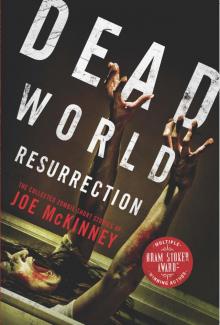 Dead World Resurrection
Dead World Resurrection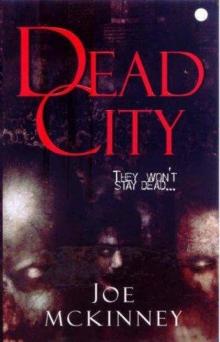 Dead City - 01
Dead City - 01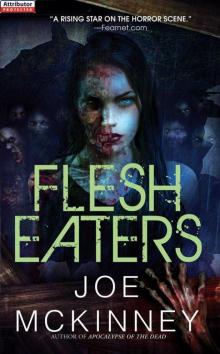 Flesh Eaters
Flesh Eaters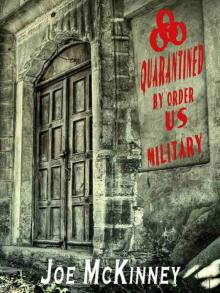 Quarantined
Quarantined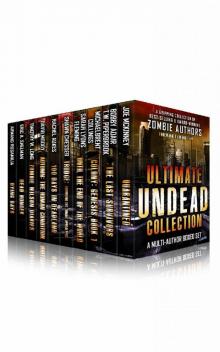 Ultimate Undead Collection: The Zombie Apocalypse Best Sellers Boxed Set (10 Books)
Ultimate Undead Collection: The Zombie Apocalypse Best Sellers Boxed Set (10 Books)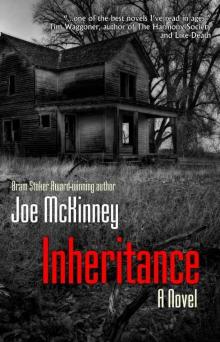 Inheritance
Inheritance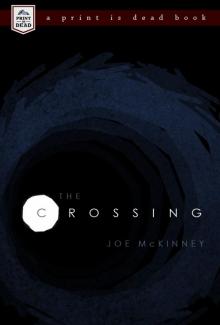 The Crossing: A Zombie Novella
The Crossing: A Zombie Novella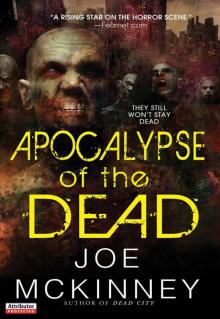 Apocalypse of the Dead
Apocalypse of the Dead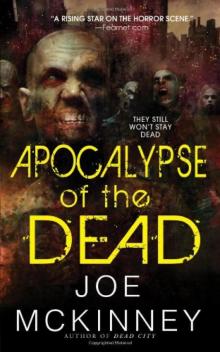 Apocalypse of the Dead - 02
Apocalypse of the Dead - 02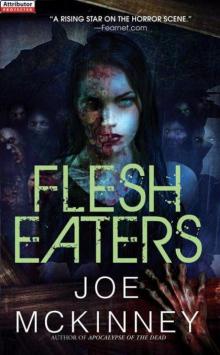 Flesh Eaters - 03
Flesh Eaters - 03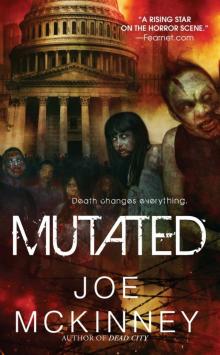 Mutated
Mutated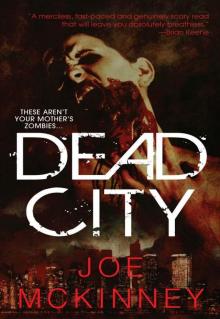 Dead City
Dead City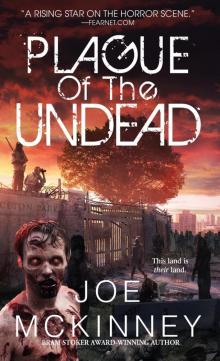 Plague of the Undead
Plague of the Undead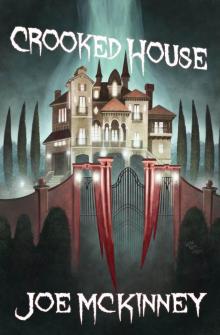 Crooked House
Crooked House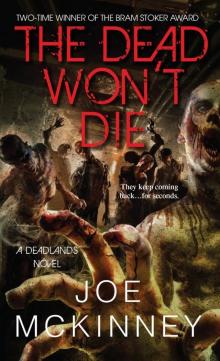 The Dead Won't Die
The Dead Won't Die